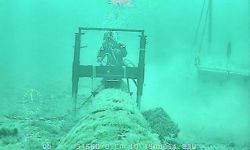Gov. Whitmer offers propane plan for Upper Peninsula after Line 5 shutdown

Nov. 18: Ignore the buzz, here’s why Enbridge Line 5 won’t likely close anytime soon
May 11: Michigan vows to seek Line 5 profits if Enbridge defies shutdown order
Update: On eve of Line 5 shutdown deadline, Enbridge vows to defy Michigan order
Gov. Gretchen Whitmer’s administration released its plan Friday to heat Michigan homes without depending on the Line 5 oil pipeline to deliver propane.
The plan calls for millions of dollars of investment in rail infrastructure and storage to help wean propane suppliers off the pipeline, plus other programs to reduce propane demand, help low-income customers pay their propane bills, and increase the state’s ability to monitor propane supplies.
The plan was praised by environmental groups, Native American tribes and others opposing Enbridge Line 5. But an Enbridge spokesperson called the plan “wholly inadequate” and at least one propane supplier raised doubts about whether it will adequately replace the propane currently supplied by the pipeline.
Related:
- Fish, propane, cash: Not everyone loves Enbridge generosity in the Straits
- Michigan regulators will consider climate change in Line 5 decision
- Is the Line 5 tunnel a bridge to Michigan’s energy future or a bad deal?
- Michigan grants Enbridge key permits to build Line 5 tunnel under Straits
- With Line 5 closure, a ‘game of chicken’ over how to heat Upper Peninsula
- Q&A: What Michigan’s move to shut down Enbridge Line 5 means
Whitmer has given Canadian oil giant Enbridge Energy until May 13 to stop transporting oil through the pipeline in the Straits of Mackinac, citing concerns that the aging underwater pipeline poses an “unacceptable risk of a catastrophic oil spill in the Great Lakes.”
Much of the plan to replace Line 5 relies on grant programs Whitmer has written into her 2022 budget proposal, meaning it may require legislative approval. Both the House and Senate are controlled by Republicans.
But the plan also notes that some propane suppliers have begun to independently wean themselves off Line 5 since Whitmer made the shutdown order in November.
Whitmer spokesperson Chelsea Lewis Parisio told Bridge Michigan the governor “is looking forward to discussions with the legislature and is hopeful that we can reach bipartisan support for her budget recommendations.”
In an interview Friday, Michigan Public Service Commission Chair Dan Scripps said the plan will put Michigan “in a good place for next winter and for whatever market changes arise.”
In the near term, he said, boosting Michigan’s propane storage options will be key.
Michigan’s storage capacity already exceeds annual consumption, but some of that space caters to customers in other states. Scripps said locking in storage through pre-purchase agreements and other strategies will help Michigan meet next winter’s demand. Other longer-term strategies will help in future winters, he said.
The plan outlines five broad strategies the state will take to wean the state off Line 5 to meet its propane needs, involving action from multiple state agencies:
- Find alternatives for propane delivery: Whitmer’s proposed 2022 budget includes $10 million for the Michigan Department of Transportation to invest in new rail infrastructure, $5 million to install propane storage at rail yards, and $100,000 for grants to local development organizations to develop alternative propane supply and delivery options. The state said it is also working with the propane industry to find other ways to deliver propane, “pre-buy” propane for next winter to lock in lower prices, and is developing a “strategic propane reserve” to prevent shortages if retailers’ supplies run low.
- Prevent price gouging, provide payment assistance: The Attorney General’s Corporate Oversight Division will handle complaints related to propane price gouging, and the administration has increased funding and restructured existing state programs to provide bill payment assistance to propane customers who can’t afford to pay their heating bills.
- Trigger market incentives: Whitmer’s order to shut down the Enbridge Line 5 pipeline “sent as clear a signal as possible to propane retailers and other propane suppliers, who are responding to this opportunity,” the governor’s release said. The plan cites recent purchases of the Upper Peninsula’s Kincheloe terminal and the Lower Peninsula’s Alto terminal as examples, and notes that some propane suppliers have begun to wean themselves off of Line 5 by using state grants to invest in rail facilities.
- Keep tabs on propane supply: The MPSC already does this, through a monitoring program that tracks state, regional and national energy supplies and maintains a plan for managing supplies and reducing propane demand.
- Boost energy efficiency: Drafty homes consume more fuel. To reduce demand for propane, the plan calls for using money in Whitmer’s proposed 2022 budget to help low-income homeowners renovate their homes to improve energy efficiency. The newly-established Michigan Propane Commission will levy a fee on propane sold in Michigan and use the proceeds on incentives and rebates aimed at boosting customers’ propane efficiency. Beyond that, Whitmer’s administration is looking for ways to meet residents’ heating needs through electric heat powered by renewable energy.
Whitmer’s plan also calls on the legislature to require fuel suppliers to give the state documents that account for their inflow and outflow of propane supply and storage.
“This reform would address the current lack of timely data on propane supply and storage information,” Whitmer’s plan said.
Representatives for Senate Majority Leader Mike Shirkey, R-Clarklake, and Speaker of the House Jason Wentworth, R-Farwell, did not immediately respond to requests for comment on whether the legislature is likely to support the actions Whitmer’s plan outlines.
Sen. Ed McBroom, R-Vulcan, a U.P. lawmaker who has been a vocal Line 5 proponent, said he believes that’s unlikely.
“They're coming to the legislature and begging us to give them more money to develop more alternatives, when the legislature already acted on this,” McBroom said, noting that Michigan lawmakers in 2018 approved plans to replace the lakebottom pipes with a new span buried in a tunnel beneath the lakebed.
The plan also urges lawmakers to expand propane price-gouging protections in Michigan — something the state Senate considered last session but never passed.
The plan builds upon 14 recommendations made last year by the U.P. Energy Task Force, a Whitmer-appointed group charged with finding alternative fuel sources for the U.P. Among them: incentivizing storage and encouraging rail investment and expanding assistance programs that help low-income families weatherize their homes and pay heating bills.
In a statement, Michigan Department of Environment, Great Lakes and Energy Director Liesl Clark, who spearheads the task force, said the group “remains focused on assessing the energy needs for the Upper Peninsula and how those needs are being met.”
“This multiagency plan takes the recommendations from the task force and implements them in a real way that will positively impact Michiganders, businesses, and our economy,” Clark said.
Upper Peninsula residents collectively use tens of millions of gallons of propane derived from fuel carried on the Enbridge pipeline to heat their homes and dry their crops. While that volume is just a small fraction of the pipeline’s 540,000 barrel-per-day capacity, it represents the majority of total propane supply in a region where 1-in-5 people rely on propane to heat their homes.
Propane from Line 5 also helps supply Lower Peninsula demand, although the pipeline represents a lower percentage of lower Michigan’s overall propane mix.
Fears that a shutdown would compromise Michigan’s energy security have been a key sticking point for Line 5 supporters who argue the lakebottom dual-span should remain in place until Enbridge can replace it with a new segment buried in a tunnel beneath the lakebed.
Enbridge routinely warns that shutting down the pipeline would strand U.P. propane customers and imperil regional refineries that get their petroleum from Line 5. A company spokesperson said in an email Friday that Whitmer’s plan is “wholly inadequate” and that the company will “vigorously defend” its right to continue operating the pipeline.
In addition to underestimating the importance of Line 5 to Michigan, Enbridge spokesperson Ryan Duffy said, “the recommendations also completely ignore the critical needs of other Great Lakes States and Canada.”
The company’s opponents, meanwhile, accuse the company of fear-mongering and said fears of a looming propane shortage are overblown. They echoed those sentiments Friday.
“Today’s plan shows that the Governor and Attorney General have done the work to prepare the state for Line 5’s inevitable shutdown,” said Beth Wallace, Great Lakes freshwater campaigns manager for the National Wildlife Federation, in a statement, “and NWF thanks these courageous state leaders for standing up for Michigan’s interests in the face of unrelenting corporate propaganda from Enbridge and their enablers.”
Liz Kirkwood, environmental attorney and executive director of Traverse City-based water advocacy group FLOW (For Love of Water), called Whitmer’s announcement the “right plan at the right time,” and emphasized the risk to Michiganders of keeping the “dangerous and outdated” pipeline in place at the bottom of the Straits.
In the months since ordering the shutdown, Whitmer had remained mum about how the state planned to make up for the pipeline’s possible shutdown, leading to a game of chicken with propane suppliers who argued the May shutdown deadline left them with too little time to plan.
On Friday, one propane supplier questioned whether the plan is enough to get Michigan ready for next winter.
“There’s going to be (propane) companies that are going to have problems, no doubt about it,” said Donald Steckman, a U.P.-based general manager for the national propane supplier for Ferrellgas.
Steckman doubted whether Michigan will be able to boost storage enough to offset Line 5’s supply before the heating season begins next fall. He said Ferrellgas has been working for two years on backup plans in case Line 5 closes, but “I’m more worried about the 80 percent of propane companies in Michigan who are independent, and don’t have contracts with every (propane) terminal in the country.”
It’s still not clear whether the pipeline will actually shut down in May, as Whitmer has ordered.
Enbridge has vowed to defy the order and sued the state in federal court. The company alleges federal regulators with the U.S. Pipeline and Hazardous Materials Safety Administration are in charge of pipeline safety, leaving Michigan with no legal authority to shut down the pipe over safety concerns.
Canadian government officials have also mounted a campaign against shutting down the pipeline, including invoking a 1977 treaty between the U.S. and Canadian governments that provides for unhindered flow of cross-border petroleum pipelines.
But Whitney Gravelle, an attorney for the Bay Mills Indian Community, challenged the notion that Canadian treaty rights should dominate. The tribe, too, has treaty-protected hunting and fishing rights in the Straits dating back to 1836, “and that treaty predates and supersedes the interest of any other sovereign,” Gravelle said.
“Tribal citizens are guaranteed the continued access to waters and lands,” she said, and Line 5 threatens that right by posing an oil spill risk in the Straits. “The federal and state governments must uphold those treaty obligations.”
In an email to Bridge Friday, a spokesperson for Attorney General Dana Nessel said state lawyers “remain confident in the legal authority of the State to address issues that pose a threat to our environment.”
While the battle rages over the looming shutdown, Enbridge is pushing forward with a plan to replace the lakebottom pipeline with a new section enclosed in a tunnel beneath the lakebed. But that project, originally slated to begin this year and wrap up in 2024, is on hold while the company awaits key state and federal permits.
Pipeline opponents have urged regulators to deny the permits, and have said they plan to file their own lawsuits if the permits are granted.
Michigan Environment Watch
Michigan Environment Watch examines how public policy, industry, and other factors interact with the state’s trove of natural resources.
- See full coverage
- Subscribe
- Share tips and questions with Bridge environment reporter Kelly House
Michigan Environment Watch is made possible by generous financial support from:
Our generous Environment Watch underwriters encourage Bridge Michigan readers to also support civic journalism by becoming Bridge members. Please consider joining today.
See what new members are saying about why they donated to Bridge Michigan:
- “In order for this information to be accurate and unbiased it must be underwritten by its readers, not by special interests.” - Larry S.
- “Not many other media sources report on the topics Bridge does.” - Susan B.
- “Your journalism is outstanding and rare these days.” - Mark S.
If you want to ensure the future of nonpartisan, nonprofit Michigan journalism, please become a member today. You, too, will be asked why you donated and maybe we'll feature your quote next time!






